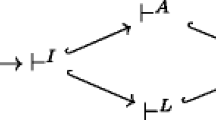Abstract
Intuitively, Gettier cases are instances of justified true beliefsthat are not cases of knowledge. Should we therefore conclude thatknowledge is not justified true belief? Only if we have reason totrust intuition here. But intuitions are unreliable in a wide rangeof cases. And it can be argued that the Gettier intuitions have agreater resemblance to unreliable intuitions than to reliableintuitions. What’s distinctive about the faulty intuitions, Iargue, is that respecting them would mean abandoning a simple,systematic and largely successful theory in favour of a complicated,disjunctive and idiosyncratic theory. So maybe respecting theGettier intuitions was the wrong reaction, we should instead havebeen explaining why we are all so easily misled by these kinds ofcases.
Similar content being viewed by others
REFERENCES
Armstrong, D.M. (1978): Universals and Scientific Realism, Cambridge: Cambridge University Press.
Bealer, G. (1998): ‘Intuition and the Autonomy of Philosophy’, in M. DePaul and W. Ramsey (eds.), Rethinking Intuition (pp. 201–240), Lanham: Rowman & Littlefield.
Cummins, R. (1998): ‘Reflection on Reflective Equilibrium’, in M. DePaul and W. Ramsey (eds.), Rethinking Intuition (pp. 113–128), Lanham: Rowman & Littlefield.
DePaul, M. and Ramsey, W. (1998): Rethinking Intuition. Lanham: Rowman & Littlefield.
DeRose, K. (1996): ‘Knowledge, Assertion and Lotteries’, Philosophical Review 74, 568–579.
Field, H. (1973): ‘Theory Change and the Indeterminacy of Reference’, Journal of Philosophy 70, 462–481.
Grice, H.P. (1989): Studies in the Way of Words, Cambridge, MA: Harvard University Press.
Horowitz, T. (1998): ‘Philosophical Intuitions and Psychological Theory’, Ethics 108, 367–385.
Horwich, P. (1999): Meaning, Oxford: Oxford University Press.
Jackson, F. (1998): From Metaphysics to Ethics, Oxford: Clarendon Press.
Langton, R. and Lewis, D. (1998): ‘Defining ’Intrinsic, Philosophy and Phenomenological Research 58, 333–345.
Langton, R. and Lewis, D. (2001): ‘Marshall and Parsons on ’Intrinsic, Philosophy and Phenomenological Research 63, 353–355.
Lewis, D. (1983): ‘New Work for a Theory of Universals’, Australasian Journal of Philosophy 61, 343–377.
Lewis, D. (1984): ‘Putnam's Paradox’, Australasian Journal of Philosophy 62, 221–236.
Lewis, D. (1992): ‘Meaning Without Use’, Australasian Journal of Philosophy 70, 106–110.
Lewis, D. (2001): ‘Redefining ’Intrinsic, Philosophy and Phenomenological Research 63, 381–398.
Menzies, P. (1996): ‘Probabilistic Causation and the Pre-emption Problem’, Mind 105, 85–117.
Nelkin, D. (2000): ‘The Lottery Paradox, Knowledge, and Rationality’, Philosophical Review 109, 373–409.
Ramsey, W. (1998): ‘Prototypes and Conceptual Analysis’, in M. DePaul and W. Ramsey (eds.), Rethinking Intuition (pp. 161–177), Lanham: Rowman & Littlefield.
Rosch, E. and Mervis, C. (1975): ‘Family Resemblances: Studies in the Internal Structure of Categories’, Cognitive Science 8, 382–439.
Ryle, G. (1950): The Concept of Mind, New York: Barnes and Noble.
Shope, R. (1983): The Analysis of Knowledge, Princeton: Princeton University Press.
Sider, T. (2001): ‘Maximality and Intrinsic Properties’, Philosophy and Phenomenological Research 63, 357–364.
Smith, M. (1994): The Moral Problem, London: Blackwell.
Sosa, E. (1998): ‘Minimal Intuition’, in M. DePaul and W. Ramsey (eds.), Rethinking Intuition (pp. 257–269), Lanham: Rowman & Littlefield.
Stich, S. (1988): ‘Reflective Equilibrium,Analytic Epistemology and the Problem of Cognitive Diversity’, Synthese 74, 391–413.
Stich, S. (1992): ‘What is a Theory of Mental Representation?’ Mind 101, 243–263.
Tennant, N. (1992): Autologic, Edinburgh: Edinburgh University Press.
Unger, P. (1996): Living High and Letting Die, Oxford: Oxford University Press.
Weinberg, J., Stich, S. and Nichols, S. (2001): ‘Normativity and Epistemic Intuitions’, Philosophical Topics 29, 429–460.
Williamson, T. (2000): Knowledge and Its Limits, Oxford: Oxford University Press.
Wittgenstein, L. (1953): Philosophical Investigations, London: Macmillan.
Author information
Authors and Affiliations
Rights and permissions
About this article
Cite this article
Weatherson, B. What Good are Counterexamples?. Philosophical Studies 115, 1–31 (2003). https://doi.org/10.1023/A:1024961917413
Issue Date:
DOI: https://doi.org/10.1023/A:1024961917413




